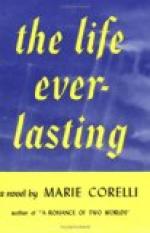I should here perhaps explain the tenor of the instruction which was gradually imparted to me in just such measures of proportion as I was found to be receptive. The first thing I was taught was how to bring every feeling and sense into close union with the spirit of Nature. Nature, I was told, is the reflection of the working-mind of the Creator—and any opposition to that working-mind on the part of any living organism It has created cannot but result in disaster. Pursuing this line of study, a wonderful vista of perpetual revealment was opened to me. I saw how humanity, moved by gross egoism, has in every age of the world ordained laws and morals for itself which are the very reverse of Nature’s teaching—I saw how, instead of helping the wheel of progress and wisdom onward, man reverses it by his obstinacy and turns it backward even on the very point of great attainment—and I was able to perceive how the sorrows and despairs of the world are caused by this one simple fact—Man working against Nature—while Nature, ever divine and invincible, pursues her God-appointed course, sweeping her puny opponents aside and inflexibly carrying out her will to the end. And I learned how true it is that if Man went with her instead of against her, there would be no more misunderstanding of the laws of the Universe, and that where there is now nothing but discord, all would be divinest harmony.
My first book, “A Romance of Two Worlds,” was an eager, though crude, attempt to explain and express something of what I myself had studied on some of these subjects, though, as I have already said, my mind was unformed and immature, and, therefore, I was not permitted to disclose more than a glimmering of the light I was beginning to perceive. My own probation—destined to be a severe one—had only just been entered upon; and hard and fast limits were imposed on me for a certain time. I was forbidden, for example, to write of radium, that wonderful ‘discovery’ of the immediate hour, though it was then, and had been for a long period, perfectly well known to my instructors, who possessed all the means of extracting it from substances as yet undreamed of by latter-day scientists. I was only permitted to hint at it under the guise of the word ’Electricity’—which, after all, was not so much of a misnomer, seeing that electric force displays itself in countless millions of forms. My “Electric Theory of the Universe” in the “Romance of Two Worlds” foreran the utterance of the scientist who in the “Hibbert Journal” for January, 1905, wrote as follows:—“The last years have seen the dawn of a revolution in science as great as that which in the sphere of religion overthrew the many gods and crowned the One. Matter, as we have understood it, there is none, nor probably anywhere the individual atom. The so-called atoms are systems of electronic corpuscles, bound together by their mutual forces too firmly for any human contrivance completely to sunder them,—alike in their electric composition, differing only in the rhythms of their motion. Electricity is all things, and all things are electric.”




